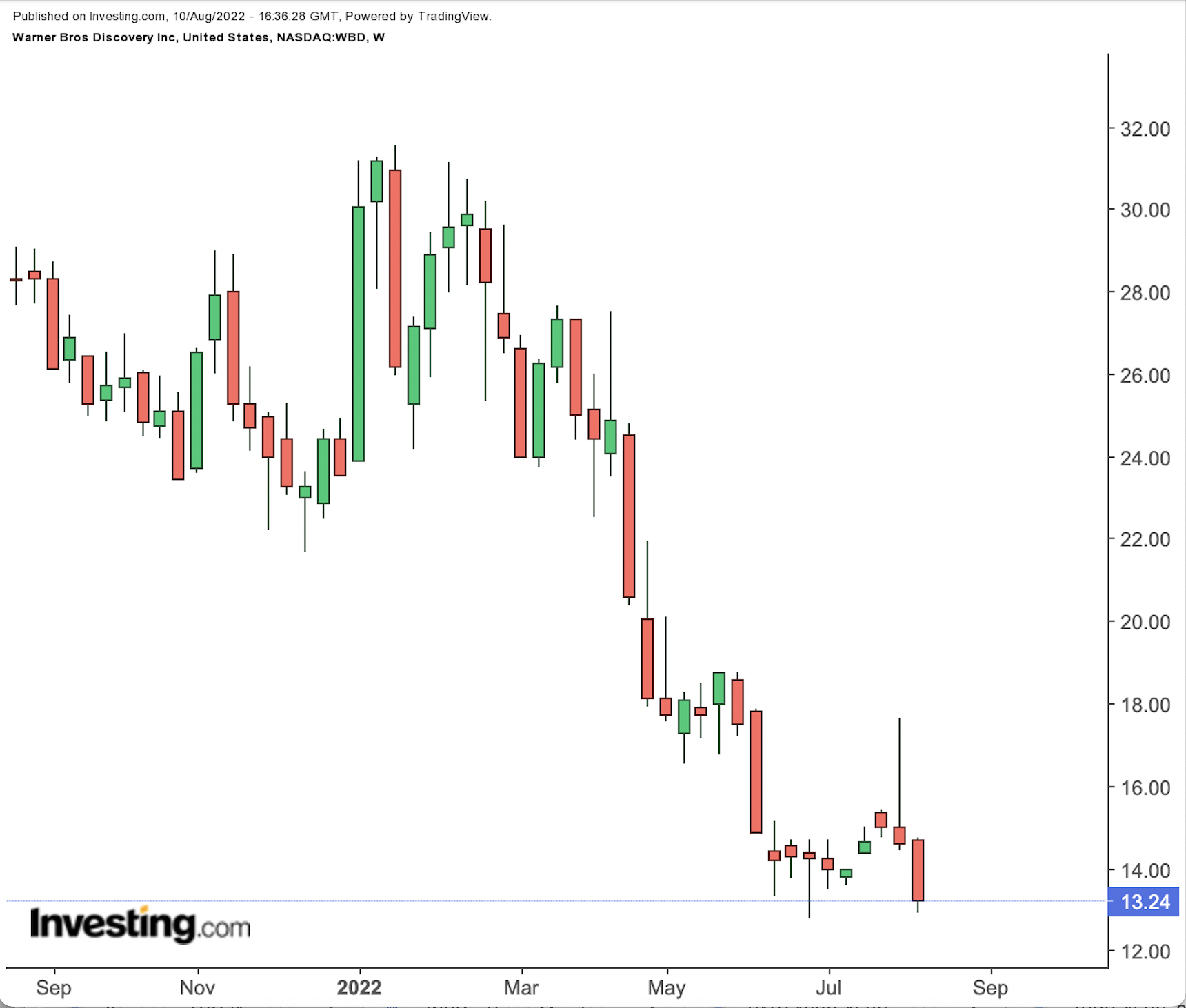- Four months after closing on its acquisition of WarnerMedia, WBD looks a lot like the business’s former owner
- Streaming does offer upside — but cord-cutting trend threatens Warner Bros. Discovery
- History shows owning a low-growth, high-debt company is a recipe for disappointment
There’s an irony in Warner Bros. Discovery NASDAQ:WBD) having acquired WarnerMedia from AT&T (NYSE:T). What Warner Bros. Discovery looks like with its new asset is an awful lot like what AT&T stock looked like with it.
Both companies faced substantial debt loads. AT&T, in fact, had the largest corporate debt load in history. Warner Bros. Discovery finished its second quarter with $53 billion in borrowings on the books.
Both stocks looked cheap. WBD stock now trades at less than 10x next year’s consensus estimate, a multiple about in line with where T stock traded for much of the time it owned WarnerMedia (the renamed business AT&T acquired in 2018 as Time Warner).
And the management teams of both companies argued that growth was just around the corner. In both cases, shareholders believed them, while outsiders were skeptical.
In the case of AT&T, management clearly was wrong, and shareholders took a hit as a result. The core problem for Warner Bros. Discovery stock after second-quarter earnings is that its story so far is sounding much the same.
The Simple Case Against WBD Stock
The problem for AT&T stock was — and still is — that a low-growth, heavily-indebted company very rarely provides acceptable returns. The path is simply too narrow. Interest expense eats up cash flow; financial leverage amplifies any downturn in any part of the business.
Second-quarter results certainly suggest that Warner Bros. Discovery is fitting that template. At the end of the quarter, debt net of cash totaled 5.0x the company’s trailing 12-month adjusted EBITDA (earnings before interest, taxes, depreciation and amortization). That’s one of the higher such ratios in the entire market.
Meanwhile, pro forma for the merger, and excluding currency effects, overall revenue declined 1% year-over-year. There are some puts and takes here — notably, the timing of film releases — but, even in that context, overall growth is muted.
The problem is that over half of revenue, and the majority of profit, comes from WBD’s networks segment. This includes the legacy Discovery properties — Discovery Channel, HGTV, Food Network, TLC – plus the jewels of the WarnerMedia portfolio, TNT and TBS.
This business simply isn’t going to grow. It’s actually somewhat impressive that the segment grew at all (though a strong economy no doubt helped). For TNT and TBS, in particular, cord-cutting and streaming are obvious threats to networks that run largely on syndicated reruns, with little original content.
As we’ll see the numbers here perhaps can work, at least based on management forecasts. But, again, when AT&T owned these assets, the numbers worked too — at least based on management forecasts. Investors in pre-merger Discovery stock thought the same, that the stock was simply too cheap relative to the cash flow the business could throw off.
T stock was one of the more disappointing names of the 2010s, providing minimal (at best) total returns even with its high dividend. Save for a crazy run in 2021, a run driven by the hedge fund Archegos Capital before it went bust, Discovery stock did nothing for years; it’s now down more than two-thirds from where it traded in 2014.

Source: Investing.com
There is just no margin for error in a business that has high debt and low growth. Costs have to be managed exactly, the external environment has to cooperate and investments often have to be curtailed. Any issue cascades down the profit-and-loss statement, cutting free cash flow, while debt amplifies the impact of lower expectations on equity value. It’s really, really difficult for a business like Warner Bros. Discovery to drive solid returns.
Reason For Hope
That problem played out in the Q2 report. WBD cut its outlook for EBITDA in 2023 by $2 billion, which means lower cash flow and lower debt repayment, and the stock has declined 25% in three sessions as a result.
Admittedly, the discussion so far leaves out one key part of the WBD business: streaming. Like other companies trying to play catch-up with Netflix (NASDAQ:NFLX), Warner Bros. Discovery is investing heavily behind its streaming platforms. Pro forma adjusted EBITDA in the quarter was a loss of $560 million — yet the business would be profitable if management chose to make it so.
On the Q2 conference call, management said that streaming would be profitable in 2024 and would hit $1 billion in EBITDA in 2025. That’s a roughly $3 billion reversal from the current run rate, for a business that management expects will earn $9 billion to $9.5 billion in EBITDA this year.
With cost synergies on the way, management projects “at least $12 billion” in EBITDA next year. By 2025, assuming streaming indeed hits targets, in theory WBD would be above that level. Given a current enterprise value of about $87 billion, there’s a path where the stock doubles over the next few years. A 9x multiple on $13 billion in EBITDA, with some debt reduction, gets the market cap in the range of $75 billion-$80 billion against the current $38 billion.
But there’s a specific catch here. The growth in streaming is going to come amid the same trend that is pulling dollars away from TNT and TBS, whether via affiliate fees from cable companies or via advertising spend. WBD has an opportunity in streaming precisely because of the same factors that are likely to lead the networks segment to enter a decline. Here, too, there’s an echo of AT&T, whose highly profitable wireline business has eroded amid ever-improving wireless service.
There’s a general catch as well. We’re still talking about management targets, not actual results. And Warner Bros. Discovery management actually cut the 2023 target just four months after the merger closed.
Investors are skeptical toward even those lower targets — and they should be. AT&T and IBM (NYSE:IBM) and General Electric (NYSE:GE), too, gave outlooks that suggested their stocks were cheap. From a long-term perspective, none of them truly were.
Perhaps WBD is different. Perhaps investors simply are overreacting. Again, there’s big upside if that’s the case — but the history of both Warner Bros. Discovery and companies like it shows that there’s room for more downside as well.
Disclaimer: As of this writing, Vince Martin has no positions in any securities mentioned.
